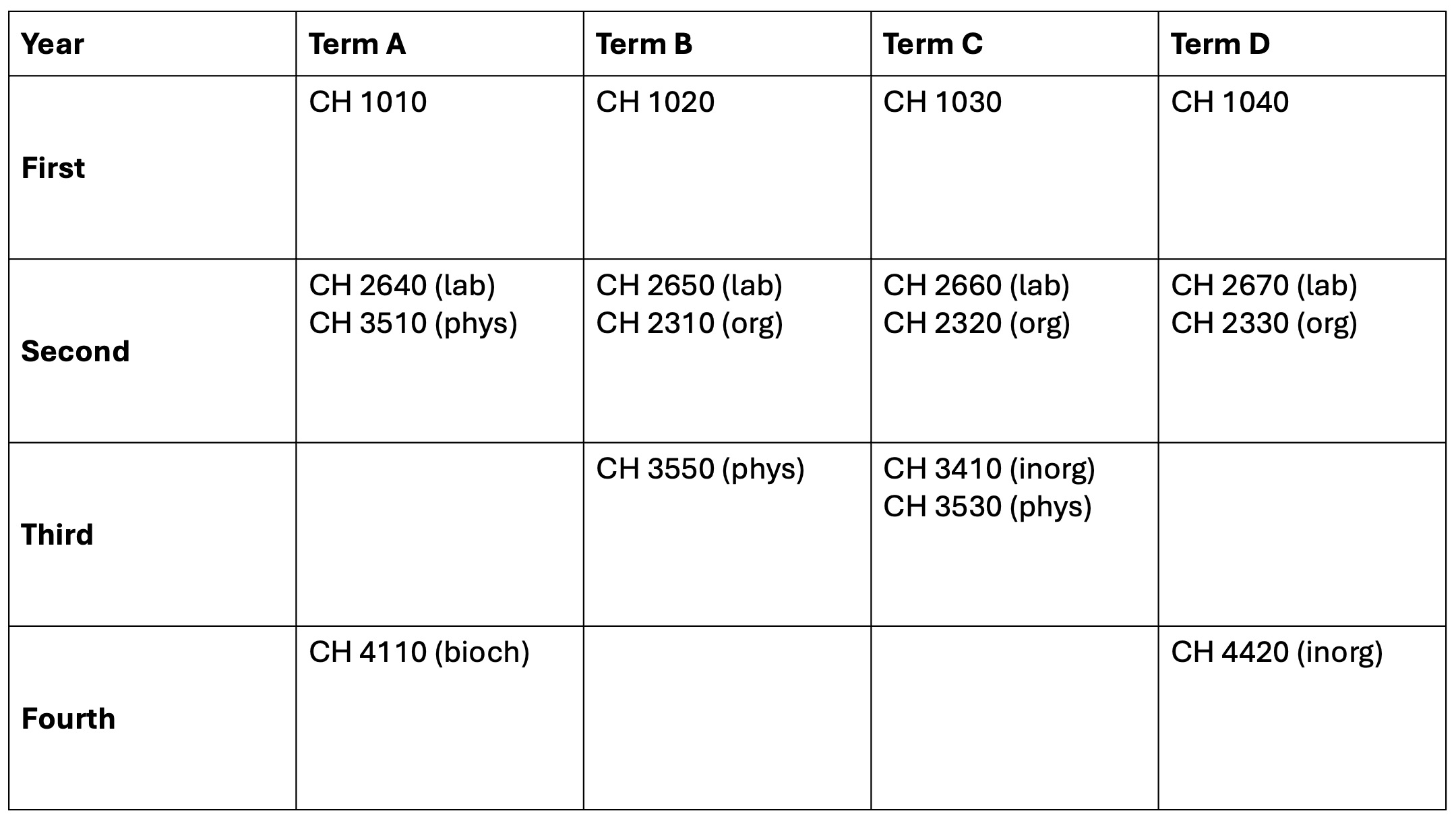Program Distribution Requirements for the Chemistry B.S.
In addition to the WPI requirements applicable to all students (see page 7), students wishing to graduate with a degree in chemistry must meet the distribution requirements detailed below.
Mathematics
Physics
Recommendations for Students
Chemistry utilizes many of the concepts of physics and the tools of mathematics. Students should acquire a background in these subjects early in their programs. The material addressed in MA 1021 through MA 1024 is recommended for all chemistry majors. Students will also benefit from knowledge of differential equations, as discussed in MA 2051. Physics background should include mechanics, and electricity and magnetism. Either the PH 1110-1120 or the PH 1111-1121 sequence is recommended. Students seeking more depth in physics are advised to pursue PH 1130 and PH 1140.
Students seeking ACS certification (see below) should plan to study calculus through introductory multivariable calculus (MA 1021-1024), differential equations (MA 2051) and linear algebra (MA 2071), and should take a minimum of two courses in physics (for example, PH 1111 and PH 1121).
American Chemical Society Approval and Certification
The Department of Chemistry and Biochemistry has an American Chemical Society (ACS) approved program. Thus graduates who complete programs satisfying the ACS recommendations have their degrees certified to the society by the department. Accordingly, students can earn an “ACS-Certified Degree in Chemistry” or an “ACS-Certified Degree in Chemistry with a Biochemistry Option.”
ACS-Certified graduates are eligible for immediate membership in the ACS and thus are able to secure the benefits of membership, which include helpful services such as finding employment.
ACS-Certified Degree in Chemistry
The above sequence of courses, recommended to provide fundamental background in chemistry, will result in an ACS-certified degree in chemistry. Specialization in particular areas of interest is best accomplished via additional courses and projects, generally taken in the third and fourth years.
ACS-Certified Degree in Chemistry with a Biochemistry Option
Students seeking the ACS-Certified Degree with Biochemistry Option must complete the following work in addition to those requirements noted above for an ACS-Certified Degree in Chemistry.
- 1/3 unit of biology which contains cell biology, microbiology or genetics.
- 2/3 unit of biochemistry that has organic chemistry as a prerequisite.
- 1/3 unit of a laboratory in biochemical methods.
- Research in biochemistry culminating in a comprehensive written report is highly recommended.
Project Activity
A student undertaking a Major Qualifying Project in chemistry and biochemistry chooses a faculty advisor in the department with whom to work. This choice is normally made because the student is interested in the research program directed by the faculty member, and wants to become a part of this activity. The student is given a research problem to work on for a minimum of 20 hours a week for 3 terms. Although most MQP projects in chemistry and biochemistry are individual student efforts, team projects involving up to 3 students are occasionally available, depending on the faculty member concerned. The project culminates in a formal written MQP report and a poster session presentation to the department faculty and students. MQP projects in chemistry and biochemistry require a substantial effort from the student in both the laboratory and writing phases. Many projects result in professional publications and/or presentations at professional meetings. The department offers a variety of areas of specialization (see AREAS OF SPECIALIZATION IN CHEMISTRY AND BIOCHEMISTRY below) in which Major Qualifying Projects may be carried out.
Some students, particularly those in biochemistry, choose to do their MQPs at off-campus laboratories. Biochemistry projects have recently been completed at the University of Massachusetts Medical Center and Tufts University School of Veterinary Medicine.
Areas of Specialization in Chemistry and Biochemistry
Computational Chemistry and Molecular Modeling
Gene Regulation
Homogeneous Catalysis
Ion Transport
Materials
Medicinal Chemistry
Membrane Proteins
Membrane Signaling Processes
Molecular Spectroscopy
Nanoscale Design
Natural Products Synthesis
Animal-Virus Biochemistry
Photochemistry
Photophysics
Sensors
Supramolecular Chemistry
Project Activity
A student undertaking a Major Qualifying Project in chemistry and biochemistry chooses a faculty advisor in the department with whom to work. This choice is normally made because the student is interested in the research program directed by the faculty member, and wants to become a part of this activity. The student is given a research problem to work on for a minimum of 20 hours a week for 3 terms. Although most MQP projects in chemistry and biochemistry are individual student efforts, team projects involving up to 3 students are occasionally available, depending on the faculty member concerned. The project culminates in a formal written MQP report and a poster session presentation to the department faculty and students. MQP projects in chemistry and biochemistry require a substantial effort from the student in both the laboratory and writing phases. Many projects result in professional publications and/or presentations at professional meetings. The department offers a variety of areas of specialization (see AREAS OF SPECIALIZATION IN CHEMISTRY AND BIOCHEMISTRY below) in which Major Qualifying Projects may be carried out.
Some students, particularly those in biochemistry, choose to do their MQPs at off-campus laboratories. Biochemistry projects have recently been completed at the University of Massachusetts Medical Center and Tufts University School of Veterinary Medicine.
Areas of Specialization in Chemistry and Biochemistry
Computational Chemistry and Molecular Modeling
Gene Regulation
Homogeneous Catalysis
Ion Transport
Materials
Medicinal Chemistry
Membrane Proteins
Membrane Signaling Processes
Molecular Spectroscopy
Nanoscale Design
Natural Products Synthesis
Animal-Virus Biochemistry
Photochemistry
Photophysics
Sensors
Supramolecular Chemistry

